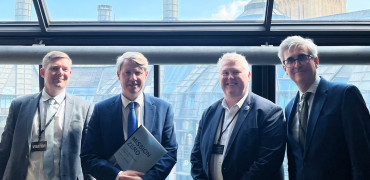Dave Archer looks at the role of continuous improvement in HVAC manufacturing to deliver sustainable HVAC systems.
In the evolving landscape of HVAC (Heating, Ventilation, and Air Conditioning) systems, continuous improvement in product development is not just a strategy for enhancing performance and reliability; it is also vital for achieving energy efficiency and low-carbon solutions.
Continuous improvement is crucial in an era when sustainability and energy conservation are required by clients and increasingly mandated through regulations. For example, there are growing considerations around the embodied and operational carbon of energy-using products within buildings.
These factors mean it’s increasingly important for specifiers to understand the principles of modern manufacturing methods.
Efficient and low-carbon HVAC systems are crucial components of low-carbon buildings
Lower operational costs
Continuous improvement in HVAC manufacturing is an ongoing process of refining and enhancing product designs and manufacturing processes.
This iterative process is critical to developing more energy-efficient and lower-carbon HVAC systems.
By constantly evaluating and optimising every aspect of the HVAC unit, from the refrigeration circuits to the electronic controls, manufacturers can significantly reduce the energy consumption of these systems.
This results in lower operational costs and contributes to a substantial reduction in carbon emissions.
Sustainable materials
Pursuing continuous improvement also leads to advancements in materials and design innovations. Newer, more sustainable materials and innovative design approaches can substantially improve the thermal efficiency of HVAC systems.
For instance, developing advanced insulation materials or more efficient heat exchange mechanisms translates into reduced energy usage and a smaller carbon footprint.
One example of this approach is at Mitsubishi Electric Hydronics and IT Cooling Systems (MEHITS). We work with partners Climaveneta and RC Group across twelve specialised facilities and seven testing centres globally.
Our manufacturing teams emphasise four production cornerstones: safety, sustainability, quality, and lean production. These are the focus at every stage, from product design to the choice of packaging to meet stringent recycling and waste-reduction goals.
Increasing productivity
Of course, Mitsubishi Electric benefits from the continuous improvement approach. One of the primary advantages of adopting a continuous improvement approach is increased productivity.
This is achieved by eliminating waste, enhancing product quality, improving customer service, and driving efficiencies to optimise productivity. It also allows us to be flexible and to respond to changing market needs.
But it also benefits our customers and the end users of our products. For example, product quality is an integral element of improvement.
Our manufacturing facilities have made significant investments in employee training, both basic and advanced, at their in-house dojo, ensuring that every component made meets the highest standards. This relentless focus on quality provides peace of mind for our customers.
Continuous improvement also allows us to incorporate new technologies into our products. Smart HVAC systems with sensors and IoT (Internet of Things) capabilities can optimise their performance based on real-time data, leading to more efficient energy use and better indoor air quality. These systems can adjust automatically to changes in external and internal conditions, minimising energy waste.
Sustainable buildings
The impact of continuous improvement in HVAC systems extends beyond the individual units to the sustainability of buildings. Efficient and low-carbon HVAC systems are crucial components of low-carbon buildings designed to reduce the built environment's environmental impact.
The journey of continuous improvement in HVAC manufacturing is a testament to the industry's commitment to addressing the critical need for energy-efficient, low-carbon solutions in today's buildings.
By focusing on incremental enhancements, embracing new materials and technologies, and adhering to stringent environmental standards, HVAC manufacturers like Mitsubishi Electric play a pivotal role in shaping a more sustainable and energy-efficient future.
Dave Archer is Business Manager - Influenced Sales




